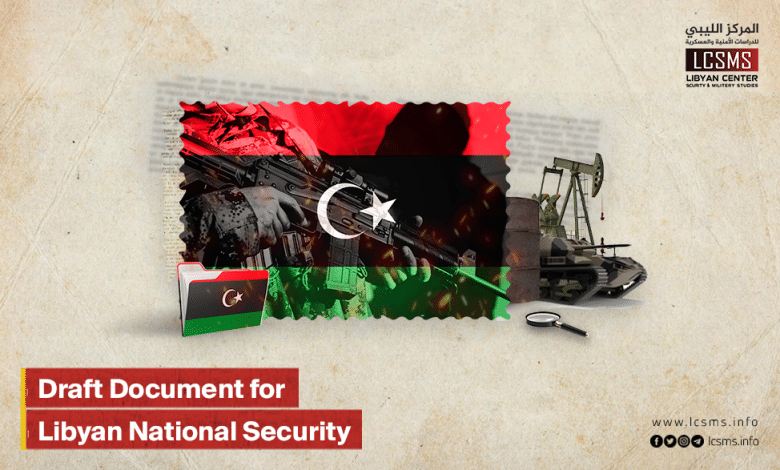Draft Document for Libyan National Security

Draft Document for Libyan National Security
Libyan Center for Security and Military Studies
Based on the role of the Libyan Center for Security and Military Studies in contributing to raising awareness of national security, which is increasingly important for states in a strategic environment characterized by volatility, suspicion, ambiguity, and complexity. In addition to the security challenges, threats, and risks facing the Libyan state due to internal conditions and the changing external environment, along with the successive events in the Middle East and the African Sahel region that are experiencing political instability and security fragility.
The center has been dedicated to drafting a preliminary document for Libyan national security to present it to the executive and legislative authorities in the Libyan state, as well as all parties concerned with Libyan affairs, for discussion and review. The Libyan Center for Security and Military Studies proposes to the National Security Council and the Parliament in Libya the necessity of issuing a Libyan national security document to serve as a compass for formulating strategies and drafting security policies.
Libya is a country with a significant strategic geographical location in North Africa, surrounded by influential countries on the regional and international levels, and it overlooks the Mediterranean Sea with the longest African coast on the Mediterranean basin. Despite its various and substantial natural resources, Libya faces significant and severe security and political challenges.
This document aims to provide a comprehensive framework for Libyan national security, taking into account the local, regional, and international strategic environment, and the Russian-Western competition for influence in Libya. It also addresses the geopolitical challenges and the state of security fragility that threatens the division of the state.
The objective of this document is to establish a comprehensive framework for Libyan national security that addresses multiple challenges and enhances the state’s ability to achieve stability and development. The strategy relies on continuous assessment of the local, regional, and international environment to ensure its flexibility and adaptability to changes. By strengthening regional and international cooperation, addressing security fragility, and adopting comprehensive developmental policies, Libya can regain its status as a stable, unified, and prosperous state.
